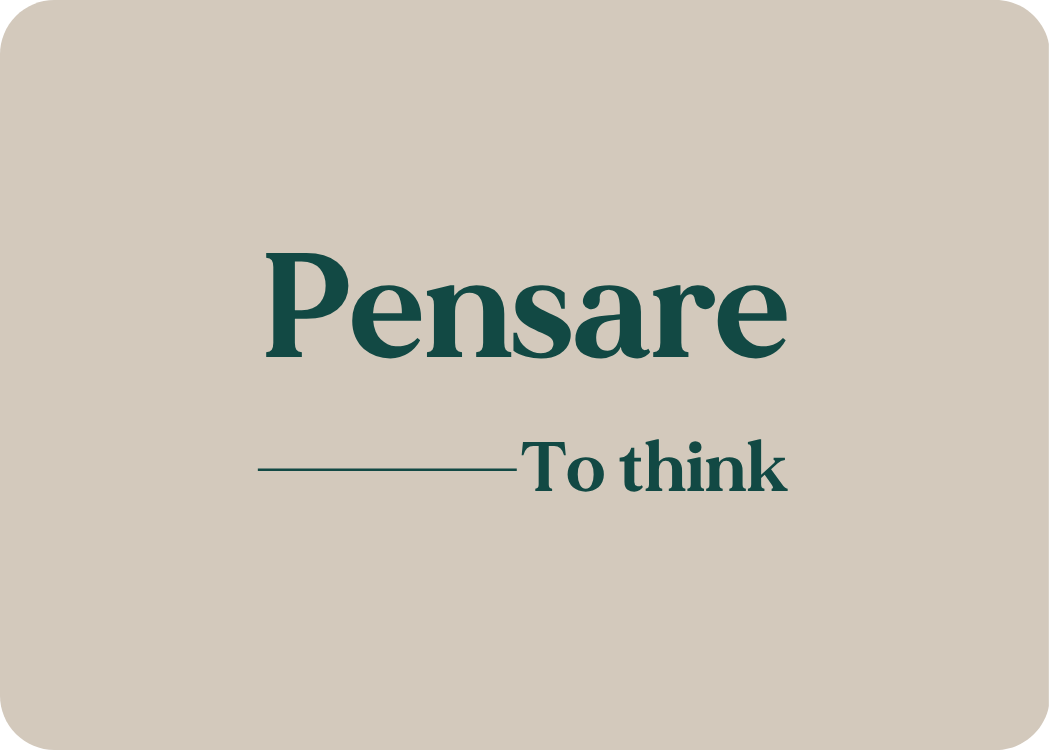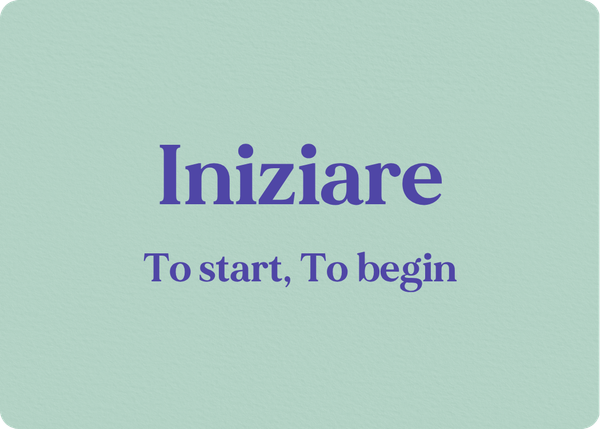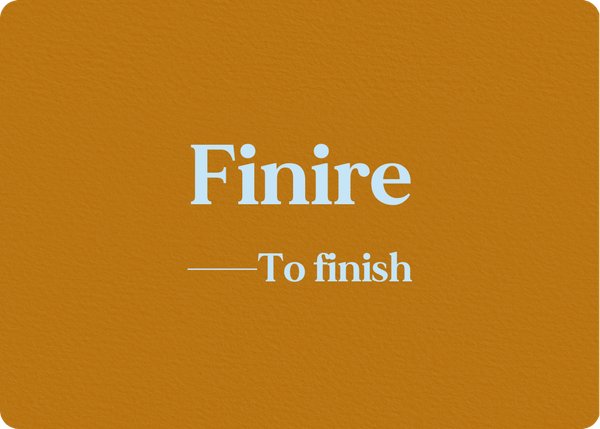What is Pensare?
Pensare is an important Italian verb meaning "to think", "to believe", or "to consider". It belongs to the first conjugation (-ARE verbs) and follows regular conjugation patterns. This fundamental verb is useful for everyday Italian conversation, from expressing opinions and thoughts to discussing beliefs and considering ideas.
Key Features of Pensare:
- Type: Regular first conjugation verb (-ARE)
- Meaning: To think, to believe, to consider, to reflect
- Auxiliary verb: Uses "avere" (to have) for conjugation in compound tenses
- Past participle: Pensato
Indicativo – Indicative Mood
Presente (Present Tense)
| Person | Conjugation |
|---|---|
| io | penso |
| tu | pensi |
| lui/lei | pensa |
| noi | pensiamo |
| voi | pensate |
| loro | pensano |
Example:
Penso spesso al nostro viaggio in Islanda!
I often think about our trip to Iceland!
Passato Prossimo (Present Perfect)
| Person | Conjugation |
|---|---|
| io | ho pensato |
| tu | hai pensato |
| lui/lei | ha pensato |
| noi | abbiamo pensato |
| voi | avete pensato |
| loro | hanno pensato |
Example:
Avete pensato alla mia proposta?
Have you thought about my proposal?
Imperfetto (Imperfect)
| Person | Conjugation |
|---|---|
| io | pensavo |
| tu | pensavi |
| lui/lei | pensava |
| noi | pensavamo |
| voi | pensavate |
| loro | pensavano |
Example:
Pensavo spesso al mio futuro quando ero adolescente.
I often thought about my future when I was a teenager.
Trapassato Prossimo (Past Perfect)
| Person | Conjugation |
|---|---|
| io | avevo pensato |
| tu | avevi pensato |
| lui/lei | aveva pensato |
| noi | avevamo pensato |
| voi | avevate pensato |
| loro | avevano pensato |
Example:
Non avevo mai pensato a questa possibilità prima di oggi.
I had never thought of this possibility before today.
Passato Remoto (Simple Past)
| Person | Conjugation |
|---|---|
| io | pensai |
| tu | pensasti |
| lui/lei | pensò |
| noi | pensammo |
| voi | pensaste |
| loro | pensarono |
Example:
Quel giorno pensai che non l'avrei mai più rivista.
That day I thought I would never see her again.
Trapassato Remoto (Past Anterior)
| Person | Conjugation |
|---|---|
| io | ebbi pensato |
| tu | avesti pensato |
| lui/lei | ebbe pensato |
| noi | avemmo pensato |
| voi | aveste pensato |
| loro | ebbero pensato |
Example:
Dopo che ebbe pensato a lungo, accettò l'offerta.
After he had thought for a long time, he accepted the offer.
Futuro Semplice (Simple Future)
| Person | Conjugation |
|---|---|
| io | penserò |
| tu | penserai |
| lui/lei | penserà |
| noi | penseremo |
| voi | penserete |
| loro | penseranno |
Example:
Penseranno loro a organizzare tutto.
They'll take care of organizing everything.
Futuro Anteriore (Future Perfect)
| Person | Conjugation |
|---|---|
| io | avrò pensato |
| tu | avrai pensato |
| lui/lei | avrà pensato |
| noi | avremo pensato |
| voi | avrete pensato |
| loro | avranno pensato |
Example:
Dopo quella telefonata, sicuramente avranno pensato di cambiare idea.
After that phone call, they will surely have thought about changing their mind.
Congiuntivo – Subjunctive Mood
Presente (Present Subjunctive)
| Person | Conjugation |
|---|---|
| che io | pensi |
| che tu | pensi |
| che lui/lei | pensi |
| che noi | pensiamo |
| che voi | pensiate |
| che loro | pensino |
Example:
Dubito che voi pensiate a me quanto io penso a voi.
I doubt that you think of me as much as I think of you.
Passato (Past Subjunctive)
| Person | Conjugation |
|---|---|
| che io | abbia pensato |
| che tu | abbia pensato |
| che lui/lei | abbia pensato |
| che noi | abbiamo pensato |
| che voi | abbiate pensato |
| che loro | abbiano pensato |
Example:
Mi fa piacere che tu abbia pensato di invitarmi.
I’m glad you thought of inviting me.
Imperfetto (Imperfect Subjunctive)
| Person | Conjugation |
|---|---|
| che io | pensassi |
| che tu | pensassi |
| che lui/lei | pensasse |
| che noi | pensassimo |
| che voi | pensaste |
| che loro | pensassero |
Example:
Credevo pensassimo le stesse cose su questo argomento.
I thought we thought the same things about this topic.
Trapassato (Past Perfect Subjunctive)
| Person | Conjugation |
|---|---|
| che io | avessi pensato |
| che tu | avessi pensato |
| che lui/lei | avesse pensato |
| che noi | avessimo pensato |
| che voi | aveste pensato |
| che loro | avessero pensato |
Example:
Se lui avesse pensato prima di parlare, non avrebbe offeso nessuno.
If he had thought before speaking, he wouldn't have offended anyone.
Condizionale – Conditional Mood
Presente (Present Conditional)
| Person | Conjugation |
|---|---|
| io | penserei |
| tu | penseresti |
| lui/lei | penserebbe |
| noi | penseremmo |
| voi | pensereste |
| loro | penserebbero |
Example:
Fossi in te, penserei a un'alternativa.
If I were you, I would think of an alternative.
Passato (Past Conditional)
| Person | Conjugation |
|---|---|
| io | avrei pensato |
| tu | avresti pensato |
| lui/lei | avrebbe pensato |
| noi | avremmo pensato |
| voi | avreste pensato |
| loro | avrebbero pensato |
Example:
Non avrei mai pensato che fosse così difficile parlare con te.
I would never have thought it was so difficult to talk to you.
Imperativo (Imperative)
| Person | Conjugation |
|---|---|
| (tu) | pensa |
| (lui/lei) | pensi |
| (noi) | pensiamo |
| (voi) | pensate |
| (loro) | pensino |
Example:
Pensa positivo!
Think positive!
Indefinite Moods
Infinito (Infinitive)
- Presente (Present): pensare (to think)
- Passato (Past): avere pensato (to have thought)
Examples:
Ho bisogno di tempo per pensare.
I need time to think.
Mi dispiace aver(e) pensato male di te.
I’m sorry for having thought badly of you.
Participio (Participle)
- Passato (Past): pensato (thought)
Examples:
Questo è un programma pensato per gli studenti.
This is a program designed for students.
Gerundio (Gerund)
- Presente (Present): pensando (thinking)
- Passato (Past): avendo pensato (having thought)
Examples:
Pensando al passato, mi viene nostalgia.
Thinking about the past, I feel nostalgic.
Avendo pensato solo al lavoro, ho trascurato i miei amici.
Having thought only of work, I neglected my friends.
The verb Pensare at a glance: Key tenses you need
| Present | Present Perfect | Imperfect | Present Subjunctive | Imperfect Subjunctive | Present Conditional |
|---|---|---|---|---|---|
| io penso | io ho pensato | io pensavo | che io pensi | che io pensassi | io penserei |
| tu pensi | tu hai pensato | tu pensavi | che tu pensi | che tu pensassi | tu penseresti |
| lui/lei pensa | lui/lei ha pensato | lui/lei pensava | che lui/lei pensi | che lui/lei pensasse | lui/lei penserebbe |
| noi pensiamo | noi abbiamo pensato | noi pensavamo | che noi pensiamo | che noi pensassimo | noi penseremmo |
| voi pensate | voi avete pensato | voi pensavate | che voi pensiate | che voi pensaste | voi pensereste |
| loro pensano | loro hanno pensato | loro pensavano | che loro pensino | che loro pensassero | loro penserebbero |
Conclusion
Mastering the conjugation of "pensare" is useful for expressing thoughts, opinions, and beliefs in Italian. As a regular first conjugation verb, it follows standard patterns throughout all tenses.
Remember the key points:
- Uses "avere" as auxiliary verb in compound tenses
- Regular first conjugation verb (-ARE) with standard patterns throughout all tenses
- Past participle is "pensato"
- Essential for expressing mental processes, opinions, and intentions
- Commonly used with prepositions "a" (to think about) and "di" (to think of doing)
Keep practicing with real sentences and contextual examples to master this Italian verb!





